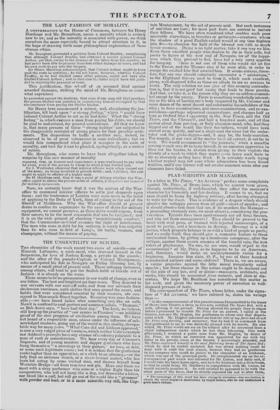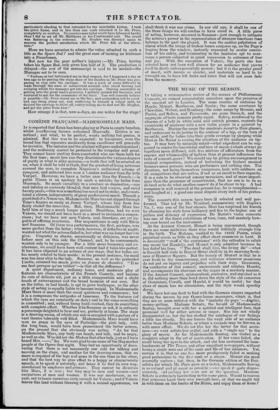PLAY-WRIGHTS AND MANAGERS.
IN a letter in The Times," AN Aunion" prefers some complaints against Mr. Price, of Drury-lane, which we cannot term grave, though, undoubtedly, if well-founded, they affect the manager's character for humanity and fair dealing. It seems to us, that no man should be hung for highway robbery, after having attempted to write for the stage. This is evidence of a despair which should absolve the unhappy person from all guilt—short of murder; and it should absolve him from that too, if he murders the Manager— a proceeding strangely rare, we must observe, considering the pro- vocations. Tyrants have been meritoriously cut off' front thrones, and why not from managements ? They should be pierced to the heart with steel pens, or brained with rejected manuscripts, of a merit to justify, and a heaviness to destroy. Revenge is a wild justice, which properly belongs to so wild a kind of people as poets; and we really think they should give a romantic feature to these mechanical times, by getting up a handsome conspiracy, after the antique, against those sworn enemies of the tuneful race, the iron rulers of playhouses. No one, we are sure, would object to the assassination* of Mr. Price, as he happens to be an American, and, therefore, would make an unexceptionable victim for a beginning. Imagine him slain, O. P., by one of three hundred confederated authors and scene-shifters! There is, we are aware, a vulgar prejudice against the little moral irregularity called murder ; but three classes in this nation ought to be declared out of the pale of any law, civil or divine—managers, architects, and cooks, who should be accounted ferce naturee, and slain at dis- cretion. We hope Mr. Bentham has considered this matter in his code, and given the necessary power of execution to well- disposed persons of taste. The correspondent of The Times, whose letter, under the signa- ture of "AN AUTHOR," we have referred to, states his wrongs thus :— "At the commencement of this present season I transmitted to the lessee of Drury-lane Theatre a farce, in two acts, entitled The Spare Bed, with a note, offering it for perusal. Having allowed the proper time to elapse before I presumed to trouble Mr. Price for an answer, I called at the theatre, and saw Mr. Hughes, the gentleman to whose care that depart.. ment is left. Mr. Hughes informed me that the title of my farce had struck Mr. Price very forcibly, and moreover, that he had it in command from that gentleman to say he was decidedly pleased with its merits. He also added, Mr. Price would see me on the subject after he recovered from a slight indisposition under which he was then labouring. One week afterwards, I received a polite note from Mr. Hughes, by desire of
Mr. Price, in which an interview was appointed for me with the latter in his private room at the theatre. I accordingly attended, and Mr. Price expressed himself in the most flattering terms of The Spare Bed; which he said he readily accepted, but was afraid nothing could be done with it until the next season, because they had no gentleman in the company who could do justice to the character of an Irishman,
which was one of the principal parts. He complimented me on the ar. travaganzical part which was intended for Mr. Liston, and flatly said, if I would take the farce home again, and turn the Irishman into a Frenchman, so that he could bring Mr. Matthews in competition with Mr. Liston, he would instantly produce it. So well satisfied he appeared to be with the other parts of the farce, that he strictly enjoined me not to alter them, * The etymology of this word has been strangely mistaken—Ass-ass-ination is clearly the strict origin—a destruction by stupid brutes, who do not understand a great man's virtues.
particularly alluding to that intended for the inimitable Liston. I took the piece home, and in less than one week returned it to Mr. Price, completely re-written. No journeyman tailor could have laboured harder than I did to set off Mr. Matthews in his Continental suit. The result was flattering in the extreme. Mr. Hughes was directed again to express the perfect satisfaction which Mr. Price felt at the altera- tion."
Here we have occasion to admire the value attached to such a title as the Spare Bed ! and the great ease of turning an Irishman into a Frenchman.
But now for the poor author's injuries :—Mr. Price, having taken his Spare Bed, only gives him half of it. The production is delayed—the rest of the manuscript is said to be mislaid—the Manager not to be seen.
"Fortune at last befriended me in that respect, for I happened a day or two ago to be passing the stage-door of the theatre as Mr. Price was pre- paring to step into his carriage. It was a work of some difficulty to wade through the mass of subservient menials who stood bowing and cringing whilst the manager got into his carriage. Having succeeded in getting into the great man's presence. I politely opened the business, and ° ventured to ask for the remainder of my farce. You will scarcely believe it possible—Mr. Price stared me in the face, and pretending not to recol- lect any thing about me, and muttering to himself a vulgar oath, he desired the carriage to drive off, rudely telling me to find out Mr. Hughes, and get the piece from him."
How strange it is that, now-a-days, no one writes for the stage!

























 Previous page
Previous page